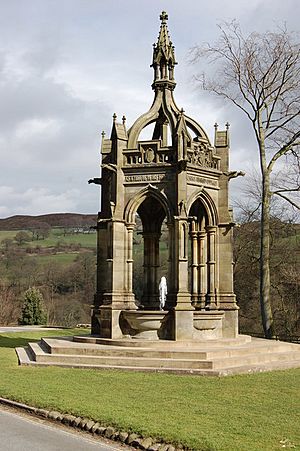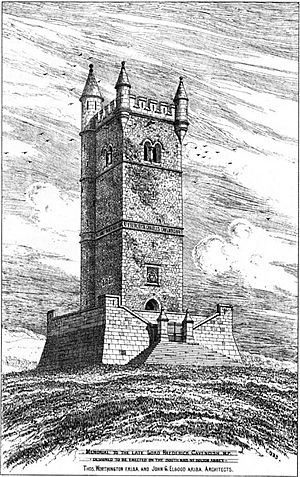Cavendish memorial fountain facts for kids
Quick facts for kids Cavendish memorial fountain |
|
|---|---|
 |
|
| Location | Bolton Abbey, North Yorkshire |
| OS grid reference | SD 075 544 |
| Built | 1885–1886 |
| Architect | Worthington & Elgood |
| Architectural style(s) | Gothic revival |
|
Listed Building – Grade II
|
|
| Designated | 8 April 1987 |
| Reference no. | 1131777 |
| Lua error in Module:Location_map at line 420: attempt to index field 'wikibase' (a nil value). | |
The Cavendish memorial fountain is a special drinking fountain built in 1886. You can find it at Bolton Abbey in North Yorkshire, England. This fountain was created to remember Lord Frederick Cavendish after he passed away in May 1882. It is considered an important historical structure and is protected as a Grade II listed building.
Contents
Why the Fountain Was Built
After Lord Frederick Cavendish died, many people wanted to build something to remember him. In September 1882, people from the Northern West Riding of Yorkshire (where he had been a Member of Parliament, or MP, since 1865) suggested building a pillar or tall monument at Bolton Abbey.
William Foster, who owned Black Dyke Mills, first led this idea. However, he passed away before the plan could be finished. A group, led by Angus Holden, then took over. They managed to collect £2,000 in donations for the memorial.
Choosing a Design
The group asked architects to submit ideas for the memorial. The design chosen was from Manchester architects Thomas Worthington and John Garrard Elgood. Their first idea was for a tall, castle-like tower to be built on South Nab. This is a high point overlooking the River Wharfe.
However, in 1884, the Duke of Devonshire (Lord Frederick's father) told the committee that many people did not like the tower idea. They felt it would spoil the natural beauty of the landscape. Because of these concerns, and the Duke's own thoughts, the committee decided to find a different solution.
Worthington and Elgood then came up with a new design: a fountain. This revised plan was accepted by the committee. They decided to build the fountain just north of the old priory, in an area called Hartington Seat.
Opening the Fountain
The construction of the fountain was finished in 1886. A special ceremony to officially open the fountain took place on June 11, 1886. More than 500 guests attended this event.
The Marquess of Ripon formally dedicated the fountain. Lord Frederick's younger brother, Lord Edward Cavendish, spoke on behalf of the Cavendish family.
What the Fountain Looks Like
The Cavendish memorial fountain was designed by Worthington and Elgood. It was built by Stephenson and Co of Manchester. The detailed carving work was done by Earp and Hobbs.
The fountain stands about 40 feet (12 meters) tall. It is made from local stone, cut into smooth, rectangular blocks called ashlar. The fountain sits on a base and is surrounded by six supports, called buttresses, arranged in a hexagon shape.
Detailed Features
A decorative band, called a frieze, connects the buttresses. On this frieze, it says: "This fountain was erected by electors of the West Riding as a tribute to his memory, Frederick Charles Cavendish Born November XXX. MDCCCXXXVI. Died May VI. MDCCCLXXXII". This means it was built to honor Lord Frederick Cavendish, noting his birth and death dates.
Each buttress has a gargoyle at the level of the frieze. Above the frieze, in the top wall (parapet), each section has a coat of arms. Two of these are the symbols of the Cavendish family. The other four are the symbols of the Lyttleton, Boyle, Clifford, and Howard families. These families are all connected to the Cavendish family's history.
Above the frieze, the memorial is topped with an open structure called a roof lantern. The Leeds Mercury newspaper described the fountain's style as Gothic. This means it looks like buildings from the medieval Gothic period, but it was built much later.
 | Selma Burke |
 | Pauline Powell Burns |
 | Frederick J. Brown |
 | Robert Blackburn |


